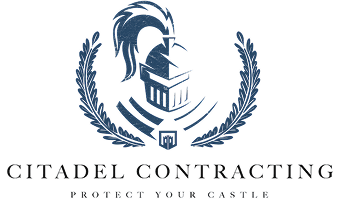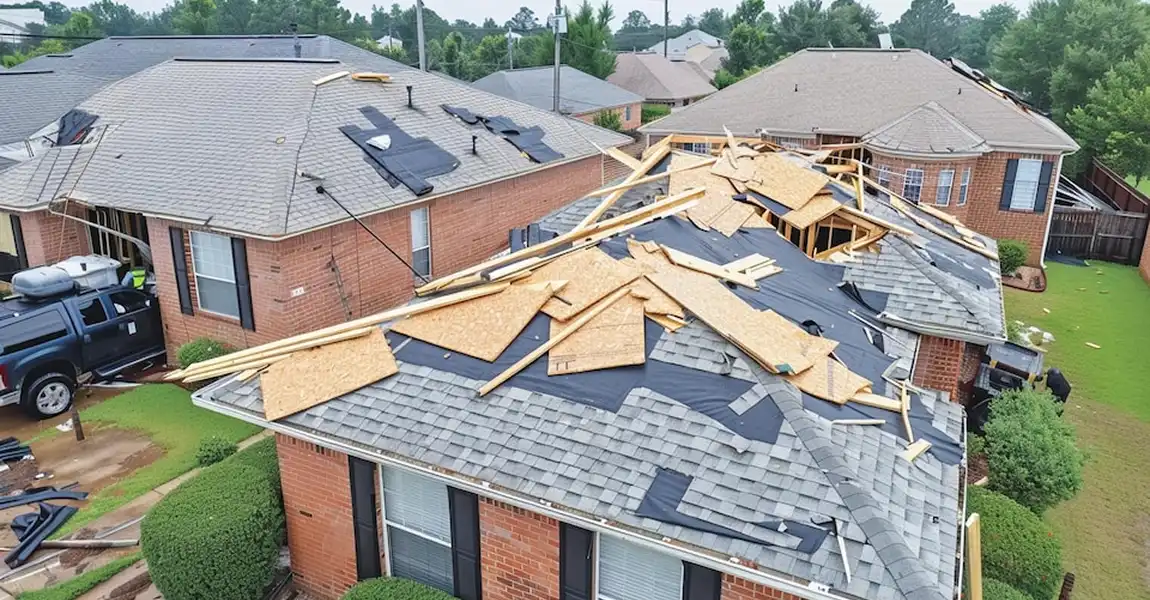Replacing a roof isn’t something most homeowners do often, which is why many people assume the costs are straightforward—you pay for materials and labor, and that’s it. But roofing projects, like any major home improvement, often come with unexpected expenses that can catch you off guard.
Whether it’s hidden structural damage, permit fees, disposal costs, or last-minute upgrades, these additional expenses can quickly add up. Without careful planning, what started as a simple roof replacement can go over budget, leaving homeowners frustrated.
If you’re in North Carolina, where the climate ranges from heavy rainstorms to intense summer heat, it’s even more important to plan ahead and prepare for anything that could impact your roofing project.
To help you avoid financial surprises, let’s break down some of the hidden costs that could come up during a new roof installation.
Roof Removal and Disposal Fees
One of the first costs that homeowners often overlook is roof tear-off and disposal. If your current roof is old or has multiple layers, removing it isn’t always as simple as it sounds.
What Can Increase the Cost of Roof Removal?
- If your home has multiple layers of shingles, it will take longer to remove, increasing labor costs.
- Some roofing materials, like slate or clay tiles, are heavier and cost more to dispose of.
- In some cities, landfill and disposal fees can be higher, especially for certain materials.
How to Avoid a Surprise Bill
Not all roofing estimates include the cost of removing and disposing of the old roof. Ask your contractor upfront if this is covered, and if not, get a breakdown of the expected fees.
North Carolina Insight
In places like Charlotte and Raleigh, landfill fees vary depending on weight and material type. If you’re switching from an older, heavier roof to a lighter one, such as asphalt shingles, you may save money on disposal costs.
Structural Repairs Beneath the Roof
One of the biggest unknowns in a roof replacement project is what’s hiding underneath. Until your old roof is removed, there’s no way to know if the wood decking or support beams are in good condition.
Common Issues That May Require Extra Repairs:
- Rotted or weakened roof decking due to water damage.
- Sagging or uneven rooflines caused by old, failing supports.
- Pest damage, such as termites or carpenter ants, weakens the structure.
How to Prepare for This Cost
Because hidden damage isn’t always obvious before work begins, it’s smart to set aside 10-20% of your budget as a cushion for unexpected repairs.
North Carolina Insight
Homes in coastal areas like Wilmington often suffer from moisture-related wood rot, especially if they’ve had past roof leaks. If your home is near the coast, consider having an inspection before committing to a roof replacement.
Permit and Inspection Fees
Most cities and counties require a permit before replacing a roof, but homeowners are often unaware that these fees can vary widely depending on location.
What You May Need to Pay For:
- Roofing permit fees are required by most municipalities.
- Historic district approvals, if your home is in a protected area.
- Final inspections, ensuring the new roof meets local building codes.
How to Avoid Delays and Extra Fees
Some contractors include permit costs in their quotes, while others leave it up to the homeowner. Before work begins, confirm who is responsible for obtaining permits.
North Carolina Insight
If you own a home in Asheville’s Montford Historic District or Chapel Hill’s historic neighborhoods, your project may require additional approvals, which could extend timelines and add costs.
Upgrading to Meet Modern Building Codes
If your home is older, the current roofing system may not meet modern building standards. During a replacement, your contractor may need to upgrade certain aspects of your roof to comply with safety regulations.
Common Code-Required Upgrades:
- Strengthening roof decking if the current material is too thin.
- Installing hurricane straps in areas prone to strong winds.
- Adding proper attic ventilation to prevent heat and moisture buildup.
North Carolina Insight
In hurricane-prone areas like New Bern and the Outer Banks, updated wind resistance codes require additional bracing and fasteners. These upgrades can increase costs, but they protect your home in severe storms.
Mold, Asbestos, or Lead Paint Removal
If your home was built before 1980, there’s a chance it contains hazardous materials that require special handling.
Potential Costs Homeowners May Face:
- Asbestos testing and removal, which is required if old shingles or underlayment contain asbestos.
- Lead paint abatement, is necessary for older soffits, fascia, or trim.
- Mold removal, which may be needed if previous leaks caused moisture buildup.
North Carolina Insight
Older homes in Greensboro and Winston-Salem may still have original roofing materials that contain asbestos. If your roof has never been replaced, consider having it inspected before starting the project.
Rising Material Costs and Delays
Roofing material prices fluctuate due to market demand, supply chain issues, and severe weather events. If your project gets delayed, you could end up paying more than expected.
How to Avoid Budget Surprises:
- Lock in material prices with your contractor before work begins.
- If possible, schedule your roof replacement during the off-season for lower prices.
North Carolina Insight
After Hurricane Florence in 2018, homeowners across Eastern North Carolina saw roofing material prices skyrocket due to increased demand. Those who booked their projects early avoided the worst price hikes.
Why Planning Ahead Saves Money
A new roof is a major investment, and while it’s easy to focus on the base cost, it’s the hidden expenses that can derail your budget. Being aware of these potential extra costs allows you to plan wisely and avoid surprises.
Key Takeaways for Homeowners:
- Always confirm whether removal and disposal fees are included in your estimate.
- Budget extra for unexpected repairs, especially for older homes.
- Check with your local building department about permit and inspection fees.
- Be prepared for code upgrades, especially in hurricane-prone areas.
- Consider an inspection for hazardous materials if your home is older.
If you’re ready to replace your roof and want a detailed estimate with no hidden fees, contact Citadel Contracting today. Our team specializes in new roof installation and ensures a transparent, hassle-free experience.










